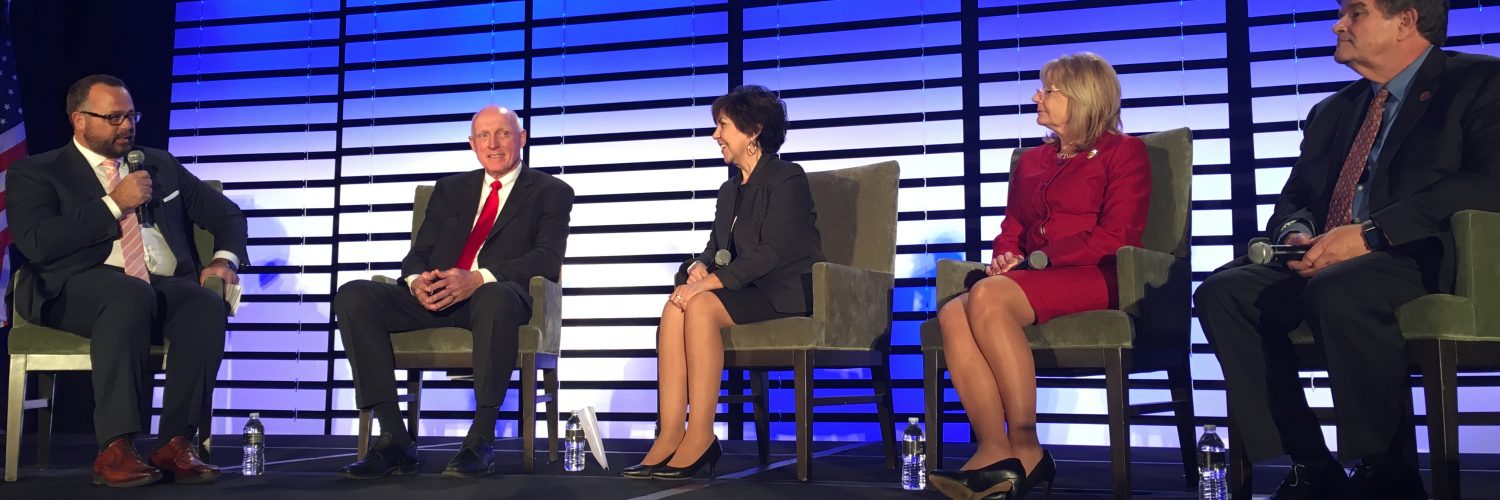Arizona lawmakers came together at the Arizona Chamber of Commerce and Industry’s legislative forecast luncheon Friday to discuss the upcoming legislative session, which begins Monday.
Speaker of the House-elect, Rusty Bowers (LD25); Senate President-elect, Karen Fann (LD1); and Minority Leaders-elect, Charlene Fernandez (LD4) and David Bradley (LD10), spoke with moderator Kirk Adams, Gov. Doug Ducey’s (R-AZ) former chief of staff and former speaker of the House, about issues that will be debated this year.
During the discussion, all said they believe 2019 will be a good year for the state because Arizona lawmakers are committed to working across the aisle.
“Everybody who is in the Senate is well seasoned, we’ve all worked together for years, so I think we’re going to have a fabulous Senate,” President Fann said. “We love our colleagues on the other side of the aisle and I’m looking forward to really good things.”
And according to Bowers he is not “looking for a cat fight or a dog fight or a fight between myself and the minority leader, and I think we’ll get some good things done.”
The panelists addressed important issues including water, education, as well as, taxes and the state’s finances.
Water:
Arizona needs to come up with an agreement on the Drought Contingency Plan before Jan. 31 to prepare for future shortages in Lake Mead. The federal Bureau of Reclamation has made it clear that if Arizona does not have a plan by the deadline, the agency will take over the process.
Last week, Ducey said in his inaugural speech that it is apparent that we are taking more water than nature can restore.
According to the state leaders, Arizona is close to completing a plan and it should be accomplished before their deadline.
“I come from Yuma County, we have the oldest water rights in the state. But what I know right now is that it means nothing unless we have a DCP plan in place,” Fernandez said. “We’re going to have to put our heads together and start learning more about water. I did travel with Speaker Bowers and I know that the water issue touches every part of Arizona. I’m anxious to get back on Monday and start working.”
“Everyone’s worked so hard on this over the last year,” Fann added. “A lot of people’s livelihoods are at stake here, so, obviously the tension is very high. It’s a statewide issue and I think everybody does have to realize we’re all going to have to work together and we’re all going to have to give up a little bit to make it all work because the alternative is not going to be acceptable.”
Bradley and Bowers both agreed that water was a top priority, stating that they have been working to understand more about the issue at hand and how to create a DCP that works.
Tax Conformity:
A previous CBN story explored whether or not Arizona should conform to changes in the federal tax code.
Now, state lawmakers are almost positive that they will simply conform.
So, the new question is: what is Arizona going to do with the expected additional revenues that will result?
Fernandez and Fann want to put some towards the “rainy day fund” to prepare for future economic declines, but also put it towards education funding promises.
“I am looking forward to have money to put into the rainy day fund. And then down the road put that money, a lot of that money, into public education funding.” Fernandez said.
According to Fann, “We made a lot of promises to education and we’re going to keep those promises. That’s going to be on the top of our list is to make sure that those monies are there not only today but tomorrow and five and ten years from now.”
Bradley, while he agrees that state should save the money, also believes that there is not a particular program the dollars should fund right now and, depending on the economy, make spending decision in the future.
Bowers said he would like to see the funds go towards clearing some of the state’s debt.
Education:
“When the teachers came and marched to the state Capitol, they were not just demanding a raise for themselves, they want support staff to get a raise, they also wanted to make sure their schools were no longer falling apart and that there were resources in the classroom so that every child could succeed,” Fernandez said. “I think the discussion is how are we going to holistically fund education.”
Fann said that she thinks the state will need to come up with a business plan so fulfilling the teacher pay increase is not left in doubt.
“We better have a business plan to make sure that money is put away and, if we can’t have that money put away, then we better be looking at an alternative resource for it,” she said. “Nobody likes to pay taxes, but the reality is that we all have to contribute to society.”
Bradley, when asked whether school districts or the state should determine teacher pay, said that districts should be the ones in charge of the money, but since the distribution of funds is not equal, the state has to step in.
“The reality is that there’s not equality in the distribution of funds, so that’s where the state has to come in and provide those resources to those school districts. I’m very much in favor, and I think our caucus is in favor, of those districts having as much control as possible over those funds,” he said.
Bowers said that the state should reexamine education as a whole, addressing all education statues.
The legislative session begins Jan. 14 when Gov. Ducey delivers the State of the State address.
















Add comment